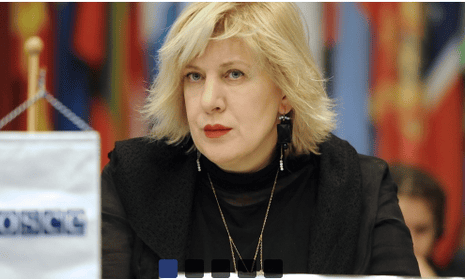Female journalists and bloggers are increasingly being singled out and fiercely attacked online, facing threats of killing, rape and violence, writes Dunja Mijatović.
Although male journalists are also subject to hate speech and online abuse, she cites research findings which suggest that female colleagues “face a disproportionate amount of gender-based threats and harassment on the internet.”
Mijatović, the media freedom representative for the Vienna-based Organisation for Security and Co-operation in Europe (OSCE), asks: how many degrading comments, criticism or even threats can one person take before it becomes too much?
She consider the experiences of a female journalist whose phone number was shared on sex dating websites, her email and other accounts were hacked and she received death threats on Skype.
There was more: the website publishing her articles was hacked and a sex video was posted with the implication that she had participated in an orgy. Anonymous articles with lies about her and her family were also posted online.
But this was only one of many such instances of female journalists “experiencing what Irina Bokova, director-general of UNESCO, has described as a ‘double attack’: being targeted for being both a journalist and a woman.”
Mijatović believes that these kinds of attack “cause severe physiological trauma for journalists and their families” and when they are “singled out and targeted with abusive comments, many female journalists may re-evaluate the issues they choose to cover. In this way, such attacks pose a clear and present threat to free media and the society as a whole.”
She calls on governments that are committed to protecting journalists’ safety to address gender discrimination. They “must ensure that law enforcement agencies understand the severity of this issue and are equipped with the necessary training and tools to more efficiently investigate and prosecute online threats and abuse.”
But she also thinks “the broader media community” should play a role by improving the “quality of content moderation without invoking censorship.”
On 17 September, her office will host a conference, “New challenges to freedom of expression: countering online abuse of female journalists”, to discuss ways to combat what she calls “this dangerous trend.” The event will be streamed live on osce.org.
Source: Index on Censorship

Comments (…)
Sign in or create your Guardian account to join the discussion